
Timeline: Shrinking space in Israel-Palestine
Illustrating the clampdown on civil society
This timeline constitutes the first in a series illustrating the clampdown on civil society in Israel-Palestine that the Diakonia International Humanitarian Law Centre Jerusalem will develop in the coming months. The timelines are organized around different actors; this timeline focuses exclusively on official measures taken by the Israeli authorities.
This timeline is not comprehensive in scope but rather seeks to provide examples of measures that are illustrative of larger patterns of behaviour restricting civil and political rights. Major historical inflection points are included for purposes of contextualization.
The last update took place on 5 October 2023.
Jump to sections of the timeline via these buttons:
Key:
![]() Measures that result in shrinking space
Measures that result in shrinking space
![]() Accountability efforts (i.e., 'pushback' against shrinking space)
Accountability efforts (i.e., 'pushback' against shrinking space)
![]() Major historical inflection points (significant in the context of shrinking civic space)
Major historical inflection points (significant in the context of shrinking civic space)
Timeline focuses on official measures taken by:
 Israeli authorities
Israeli authorities
 Palestinian Authority
Palestinian Authority
 De facto authorities in Gaza
De facto authorities in Gaza
 Third parties
Third parties
Type of act:
 Legislation
Legislation
 Administrative decision
Administrative decision
 Military order
Military order
 Court application/decision
Court application/decision
 Other policies and practices
Other policies and practices
Geographical applicability:
 Mandatory Palestine (present-day Israel and the occupied Palestinian territory)
Mandatory Palestine (present-day Israel and the occupied Palestinian territory)
 Israel (within the Green Line)
Israel (within the Green Line)
 Occupied Palestinian territory (oPt)
Occupied Palestinian territory (oPt)
 Extraterritorial/International
Extraterritorial/International
1940s
 1948 • State of Israel proclaimed
1948 • State of Israel proclaimed
On 14 May 1948, David-Ben Gurion, Chairman of the Jewish Agency for Palestine, proclaims the State of Israel. In the context of the war that follows, Israel declares a “State of Emergency” that lasts to the present day. Palestinians refer to Israel’s establishment and the associated experiences of mass displacement and loss of their historic homeland as the “Nakba” (“catastrophe” in Arabic).
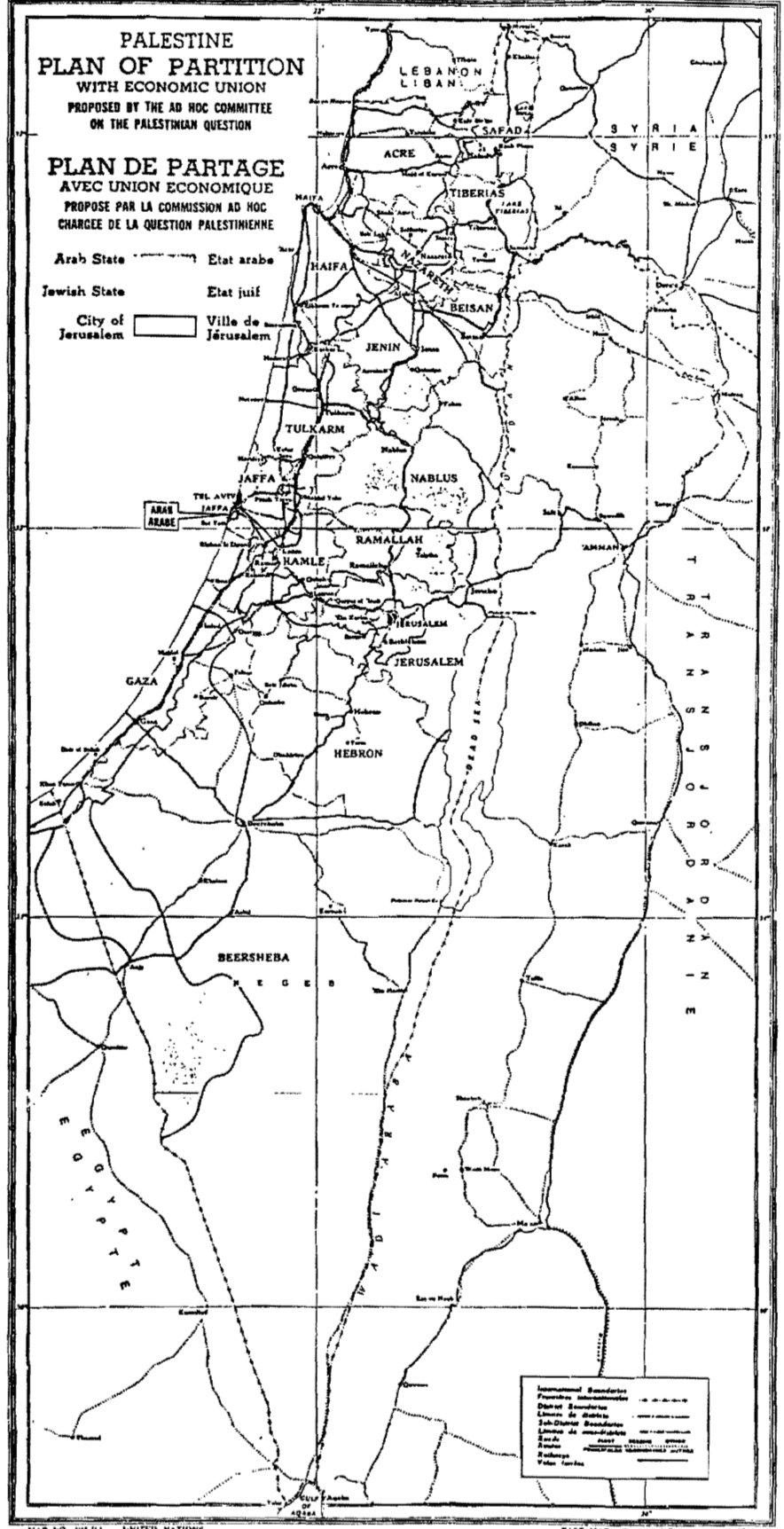
Map based on Annex A to United Nations General ASsembly Resolution 181 (II).
 1948–1966 • Palestinian citizens of Israel subjected to military rule
1948–1966 • Palestinian citizens of Israel subjected to military rule
Palestinian citizens of Israel are subjected to military rule and tried before military courts. The Emergency Regulations are one of the “enforcement mechanisms” used by the military government to curtail civil liberties and impose severe restrictions on citizens’ daily life.
Measures impacting civic space
Israeli authorities
1945 • Defense (Emergency) Regulations adopted
1948 • Revocation of the Palestine (Defence) Order in Council
1948 • Law and Administration Ordinance adopted
1948 • Prevention of Terrorism Ordinance adopted
1950s
 1948–1966 • Palestinian citizens of Israel subjected to military rule
1948–1966 • Palestinian citizens of Israel subjected to military rule
Palestinian citizens of Israel are subjected to military rule and tried before military courts. The Emergency Regulations are one of the “enforcement mechanisms” used by the military government to curtail civil liberties and impose severe restrictions on citizens’ daily life.
 1951 • Begin cautions against retaining the Emergency Regulations
1951 • Begin cautions against retaining the Emergency Regulations
Menachem Begin, at the time leader of the Revisionist Herut party (a precursor to the Likud) and later Prime Minister of Israel (1977–1983), cautions that retaining the Emergency Regulations might amount to the “long-term presence of tyrannical, fascistic laws”. The Israeli Knesset contemplates repealing the Regulations but does not do so.
1960s
 1948–1966 • Palestinian citizens of Israel subjected to military rule
1948–1966 • Palestinian citizens of Israel subjected to military rule
Palestinian citizens of Israel are subjected to military rule and tried before military courts. The Emergency Regulations are one of the “enforcement mechanisms” used by the military government to curtail civil liberties and impose severe restrictions on citizens’ daily life.
 1967 • Israel takes control of the West Bank and Gaza Strip, and annexes East Jerusalem
1967 • Israel takes control of the West Bank and Gaza Strip, and annexes East Jerusalem
Israel conquers the West Bank, including East Jerusalem, and Gaza in June 1967. It annexes East Jerusalem and extends the application of its domestic law to the area.
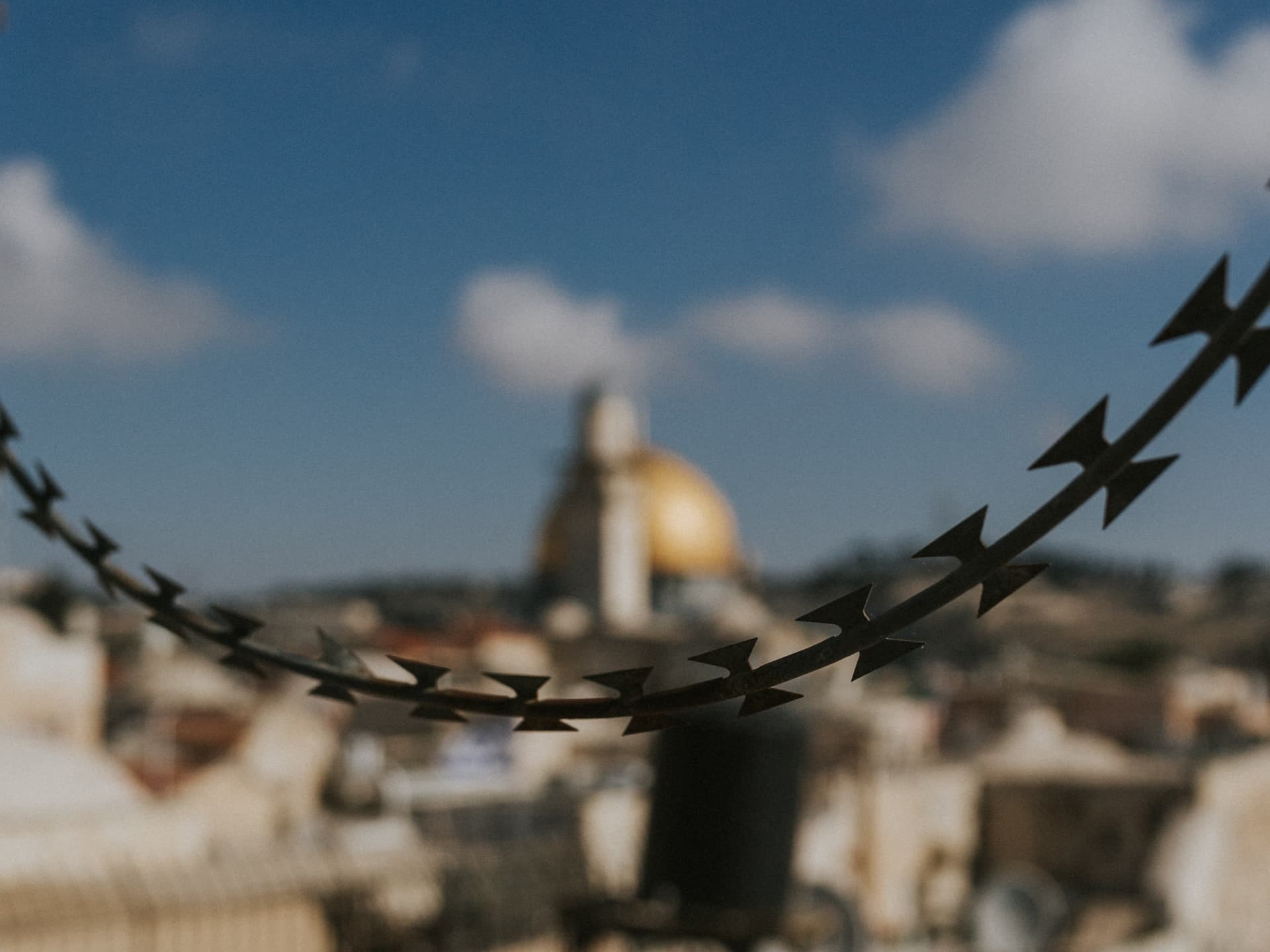
Measures impacting civic space
Israeli authorities
1964 • Al-Ard party banned from contesting the national elections
1967 • Military Order 101 issued
1967 • Military order confirming the applicability of the Emergency Regulations
1970s
 1970–1979 • Attacks against Israeli civilians
1970–1979 • Attacks against Israeli civilians
Throughout the 1970s, Palestinian groups perpetrate a series of airplane hijackings and attacks against Israeli civilians, including at the 1972 Summer Olympics in Munich, Germany.
 1979 • Egyptian-Israeli peace agreement
1979 • Egyptian-Israeli peace agreement
Following the 1973 war, Israel and Egypt reach a peace agreement pursuant to which Israel withdraws from the Sinai Peninsula occupied in 1967.
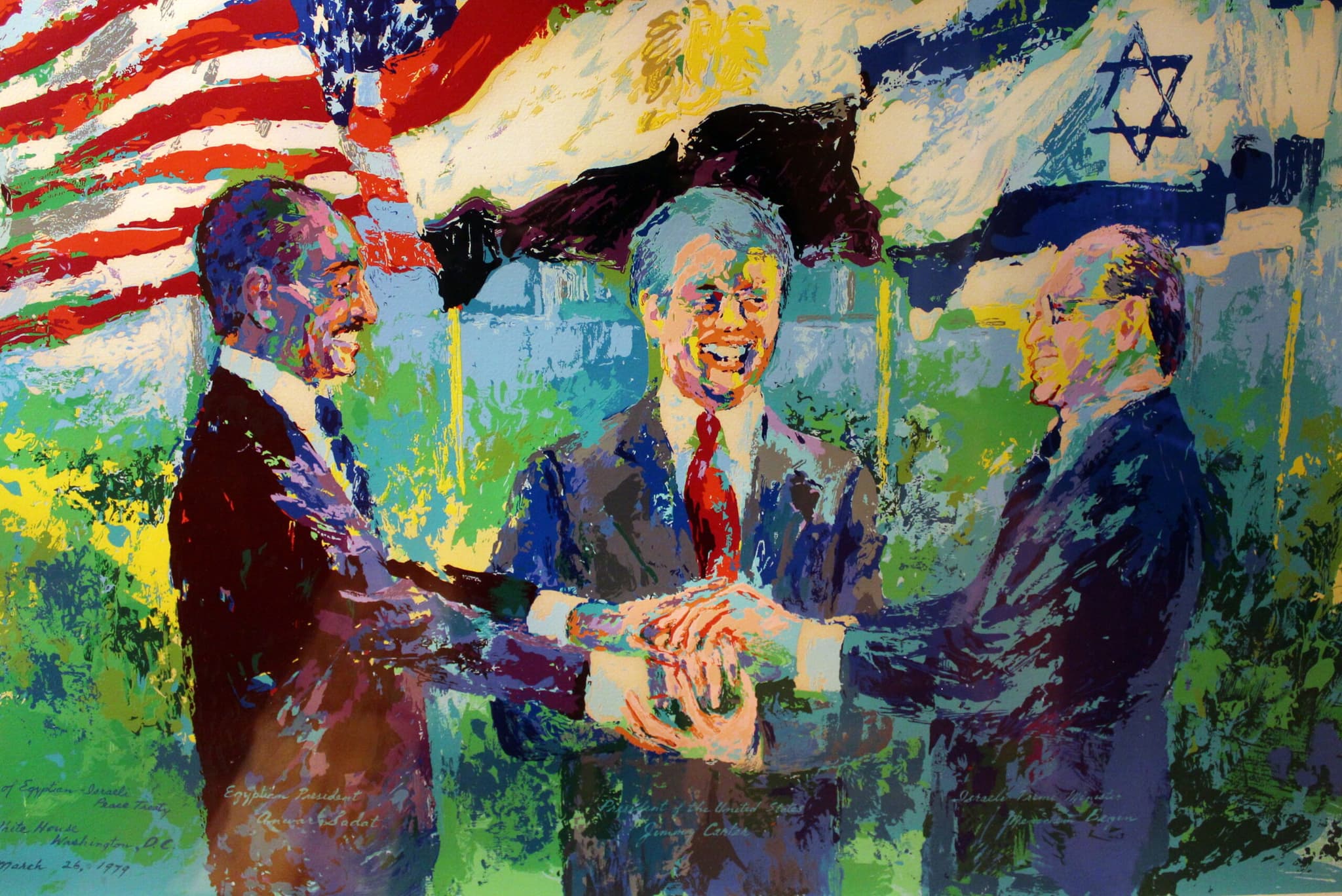
Photo: Atlanta - Poncey-Highland: Jimmy Carter Library and Museum - LeRoy Nieman by Wally Gobetz. Licensed under CC BY-NC-ND 2.0.
1980s
 1982 • Israeli invasion of Lebanon
1982 • Israeli invasion of Lebanon
Israeli forces intervene in the Lebanese civil war (1975–1990) to expel the Palestine Liberation Organization (PLO) and other Palestinian groups from Lebanon. The military takes control of Beirut’s surroundings and does not prevent combatants of its allied Phalange militia from entering the Sabra and Shatila refugee camps, where they kill at least 800 civilians.
 1987–1993 • First Palestinian Intifada
1987–1993 • First Palestinian Intifada
The First Intifada, a popular uprising against the military occupation, takes place in the oPt and in Israel. Like previous instances of political mobilization, demonstrations are met with violent repression, Israeli soldiers having been instructed by Defence Minister Yitzhak Rabin to “break the arms and legs” of protesters. According to estimates, the Israeli authorities arrest and detain around 100,000 Palestinians during the course of the uprising.
Measures impacting civic space
Israeli authorities
1986 • PLO, Fatah and PFLP designated as “terrorist organizations”
1990s
 1991 • Israel derogates from Art. 9 of the ICCPR
1991 • Israel derogates from Art. 9 of the ICCPR
In 1991, Israel derogates from Article 9 of the International Covenant on Civil and Political Rights (ICCPR) relating to arbitrary arrest and detention, on the basis of the “State of Emergency … proclaimed in May 1948” – in the context of the 1948 war – that has “remained in force ever since”.
 1993–2000 • Oslo process
1993–2000 • Oslo process
The First Intifada comes to an end with the signing of the Oslo Declaration of Principles (DOP) between Israel and the PLO on 13 September 1993, marking the beginning of the Oslo peace process. Israeli Prime Minister Yitzhak Rabin and PLO Chairman Yasser Arafat shake hands on the White House lawn.
The DOP was a framework agreement prescribing a series of negotiations and interim accords between Israel and the PLO that would culminate in a “permanent status agreement” covering the most protracted issues, namely “Jerusalem, refugees, settlements, security arrangements, borders, [and] relations and cooperation with other neighbours”.
On 4 May 1994, Israel and the PLO conclude the first interim accord, the Gaza-Jericho Agreement, pursuant to which the Palestinian Authority (PA) is created as an interim body to oversee limited Palestinian self-government, and the Israeli military partially withdraws from the Gaza Strip and the city of Jericho in the West Bank. The five-year transitional period envisaged in the DOP for the conclusion of a permanent status agreement commences.
On 28 September 1995, the Israeli-Palestinian Interim Agreement on the West Bank and the Gaza Strip (the “Oslo II Accord”) is signed, which divides the West Bank into Areas A, B and C. The PA is to exert civilian and security powers over Area A – the major Palestinian population centres – while Israel retains security control over Area B and full control over Area C. Albeit envisaged as a temporary arrangement, the division into Areas A, B and C persists to this day, and with it the multitude of checkpoints and permit requirements that restrict Palestinians’ freedom of movement.
On 4 November 1995, Israeli Prime Minister Rabin is assassinated by an Israeli extremist at a peace rally in Tel Aviv. In 1996, Benjamin Netanyahu (Likud), who has risen to prominence as leader of the opposition to the Oslo Accords, becomes Prime Minister of Israel. During Netanyahu’s first term in office, which lasts until 1999, the peace process stalls; the transitional period expires without a permanent status agreement.
 1996 • First Palestinian elections
1996 • First Palestinian elections
The first Palestinian legislative and presidential elections take place in January 1996, with participation from voters in the West Bank, including East Jerusalem, and the Gaza Strip. Yasser Arafat, Chairman of the PLO and its main faction Fatah, becomes President of the PA, having carried 87% of the vote. Legislative elections too are won by Arafat’s Fatah party, which garners a majority of the then 88 seats in the Palestinian Legislative Council (PLC). Hamas does not participate in the elections, having declared a boycott in light of its opposition to the Oslo Accords.
In the months following the “historic vote”, critics accuse Arafat of authoritarianism and sidelining the PLC.
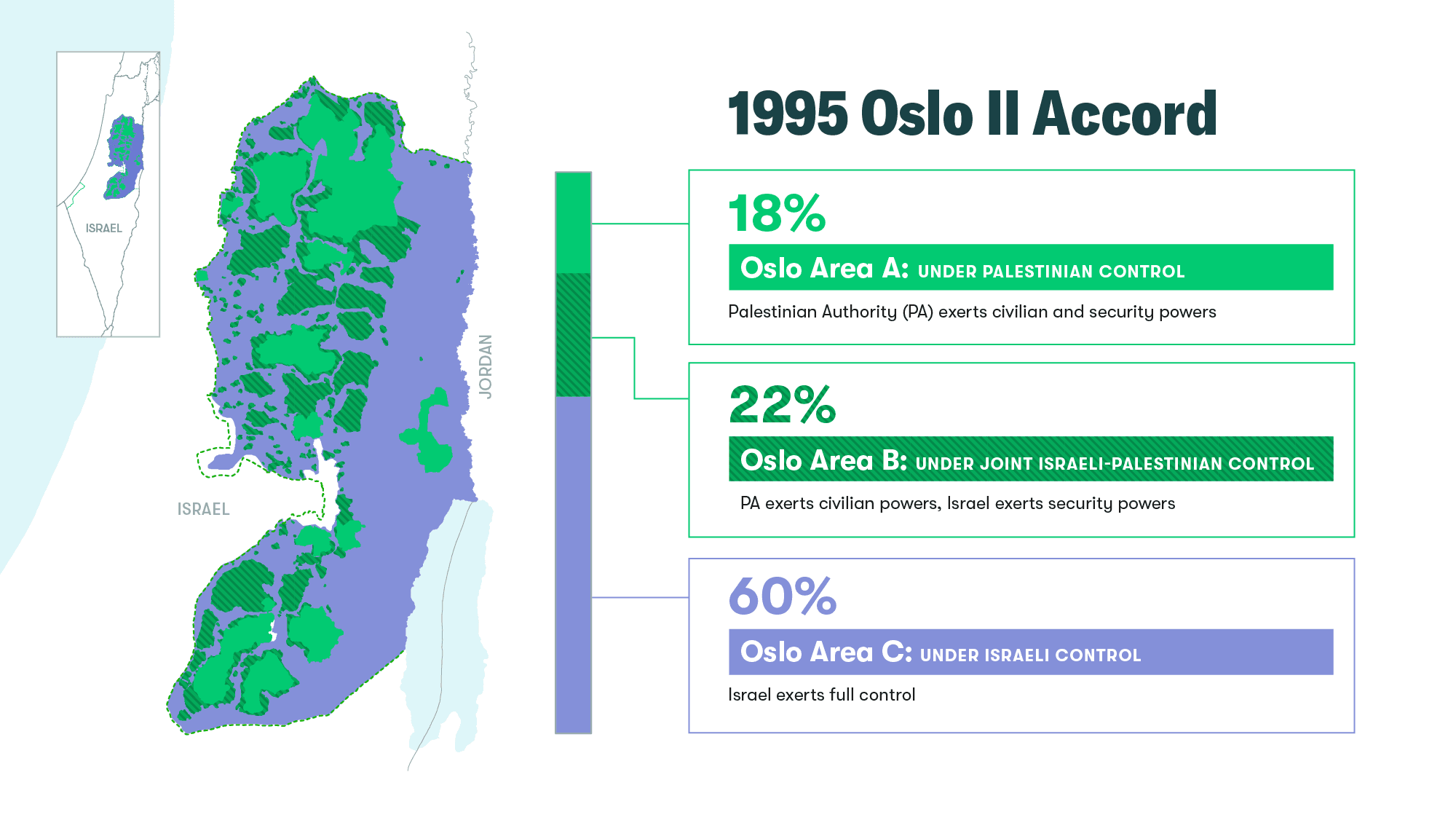
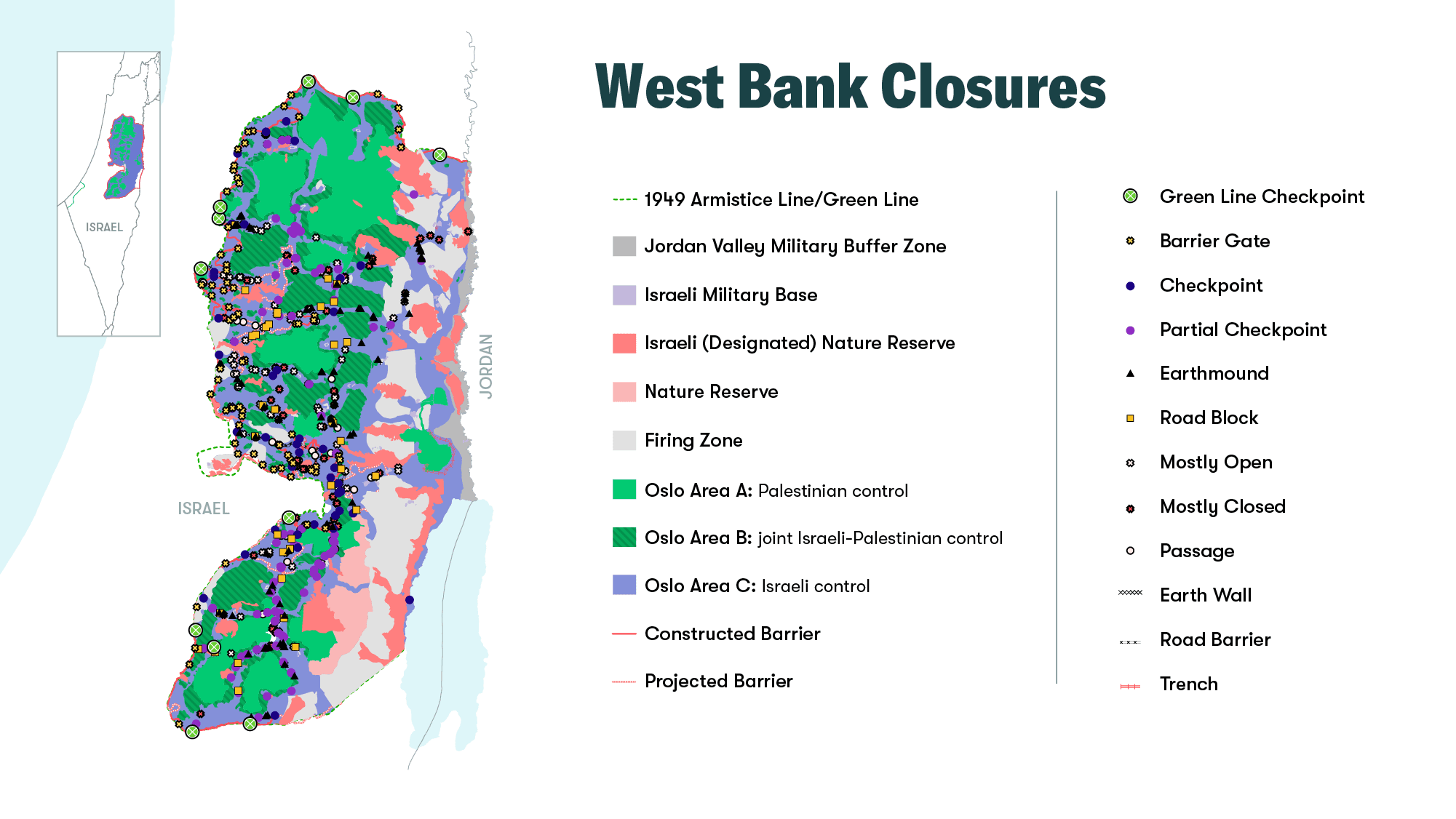
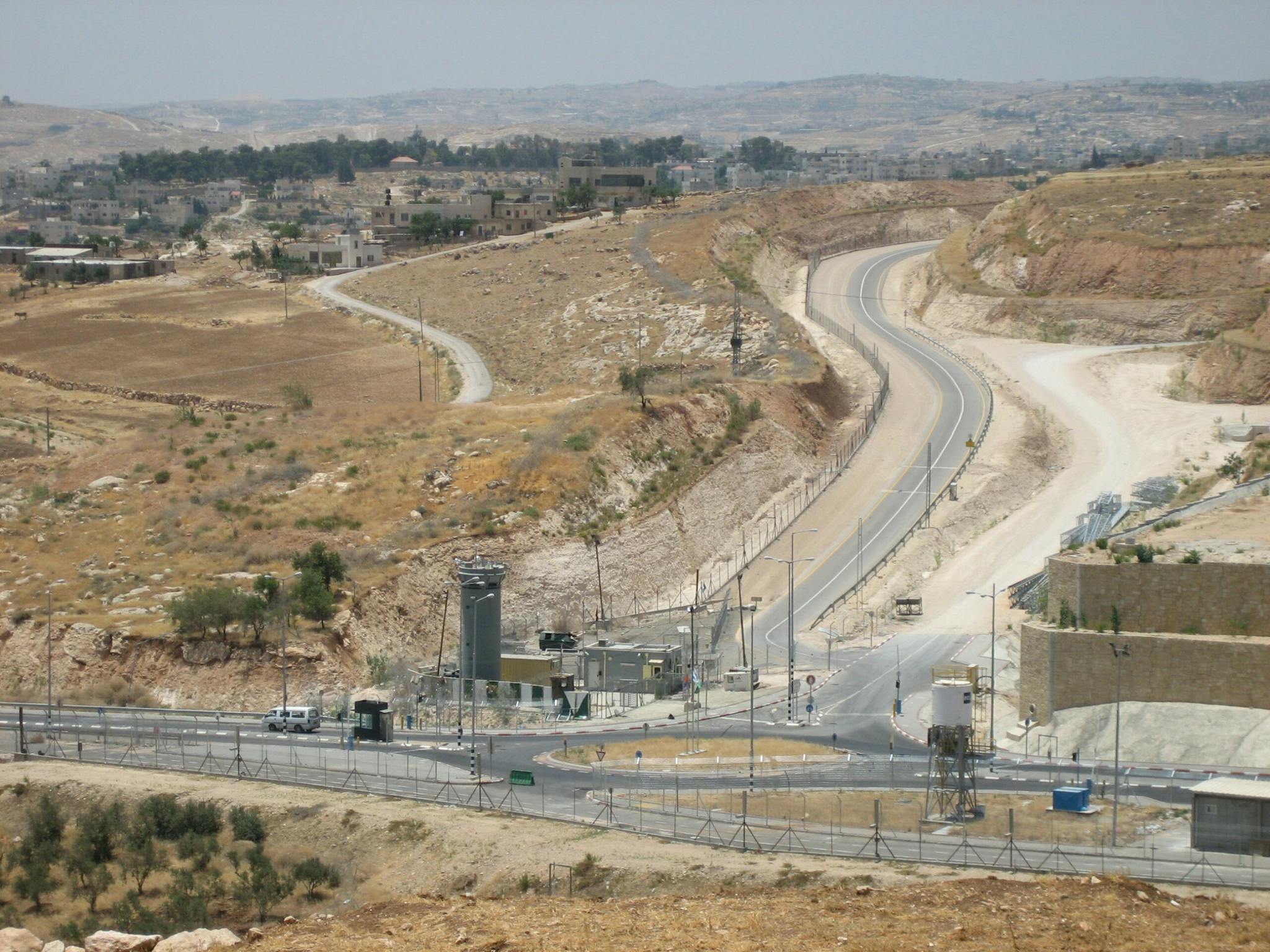
Photo: Checkpoint to a Village in the West Bank by The Advocacy Project/Rianne Van Doevern, 2008. Licensed under CC BY-ND 2.0.
Measures impacting civic space
Palestinian Authority
1995 • Press and Publications Law enacted
1996 • Political repression during the first Palestinian elections
1998-2000 • Public Meetings Law enacted and amended by administrative orders
2000s
 2000–2005 • Second Palestinian Intifada
2000–2005 • Second Palestinian Intifada
The Oslo process collapses following the unsuccessful Camp David II summit between Israeli Prime Minister Ehud Barak and PLO Chairman Yasser Arafat. Against the backdrop of “shattered dreams of peace”, the visit of Likud politician Ariel Sharon – “father of the settler movement” and former Defence Minister deemed indirectly responsible for the 1982 massacre of Palestinian civilians in the Sabra and Shatila camps outside Beirut – to the Temple Mount/Haram al-Sharif in September 2000 triggers the Second Intifada.
The second Palestinian uprising is characterized by greater violence than the first, including terrorist attacks in major Israeli cities, and at its height sees the Israeli army reoccupying parts of the West Bank that it had withdrawn from pursuant to the Oslo Accords. Over 3,000 Palestinians are killed and thousands more arrested. Israeli authorities also erect a “separation barrier” between Israel and the occupied West Bank, which in part deviates from Israel’s internationally recognized pre-1967 borders (the “Green Line”) and infringes upon the right to self-determination of Palestinians living in the occupied West Bank. The Intifada comes to an end with the February 2005 Sharm El Sheikh summit between Israeli Prime Minister Ariel Sharon and Palestinian Authority President Mahmoud Abbas.
Israel unilaterally withdraws its ground troops from the Gaza Strip in summer 2005; existing Israeli settlements are dismantled. Pursuant to the Israeli government’s “Disengagement Plan”, Israel nonetheless continues to “guard and monitor the external land perimeter of the Gaza Strip”, to “maintain exclusive authority in Gaza air space”, and to “exercise security activity in the sea off the coast of the Gaza Strip”.
 2004 • ICJ advisory opinion on the “separation barrier”
2004 • ICJ advisory opinion on the “separation barrier”
On 9 July 2004, the International Court of Justice (ICJ) – the “principal judicial organ of the United Nations” – renders its Advisory Opinion on the Legal Consequences of the Construction of a Wall in the Occupied Palestinian Territory (Wall Advisory Opinion) concerning the legality of the “separation barrier”. The Court finds, inter alia, that the wall – which is partly located deep within the West Bank beyond the “Green Line” – infringes upon the Palestinian people’s right to self-determination and calls upon Israel “to cease forthwith the works of construction of the wall” in the oPt; “dismantl[e] forthwith … those parts of that structure situated” in the oPt; and “to return the land, orchards, olive groves and other immovable property seized” in this context, or to provide compensation accordingly.
 2005 • Palestinian presidential elections
2005 • Palestinian presidential elections
After Arafat’s death in November 2004, Mahmoud Abbas of Fatah is elected President of the PA in January 2005.
 2005 • Emergence of the BDS movement
2005 • Emergence of the BDS movement
On 9 July 2005 – the one-year anniversary of the issuance of the Wall Advisory Opinion – a network of civil society organizations launches a call for Boycott, Divestment and Sanctions (BDS) of Israel, marking the emergence of the BDS movement.
 2006 • Palestinian legislative elections
2006 • Palestinian legislative elections
In the 2006 legislative elections, Hamas wins a majority – 74 of the now 132 PLC seats – followed by Fatah with 45 seats. Fatah rejects calls to join the new, Hamas-led government; Israel cuts off contact and withholds tax revenues. The Middle East Quartet – consisting of the United Nations (UN), the European Union (EU), the United States, and the Russian Federation – conditions continued aid to the PA on Hamas’ renunciation of violence, recognition of Israel, and commitment to the agreements concluded as part of the Oslo process, which Hamas refuses.
 2007 • Hamas takeover of Gaza and suspension of the PLC
2007 • Hamas takeover of Gaza and suspension of the PLC
Despite attempts at Fatah-Hamas reconciliation and the eventual formation of a short-lived national unity government in March 2007, clashes between Fatah and Hamas that have been ongoing since late 2006 culminate in the latter’s takeover of the Gaza Strip in June 2007. President Abbas declares a state of emergency. The PLC has been suspended ever since, with Abbas ruling by presidential decree in the West Bank, and Hamas adopting separate laws for Gaza. In response to the Hamas takeover, Israel imposes a “land, sea and air blockade” on Gaza.
 2008-2009 • Gaza war
2008-2009 • Gaza war
Between December 2008 and January 2009, Israel carries out a large military offensive in the Gaza Strip, which kills an estimated 1,383 Palestinians, including over 300 children.
Measures impacting civic space
Israeli authorities
2006 • Punitive travel ban against Shawan Jabarin of Al-Haq
2009 • Attempts to discredit the Goldstone Report
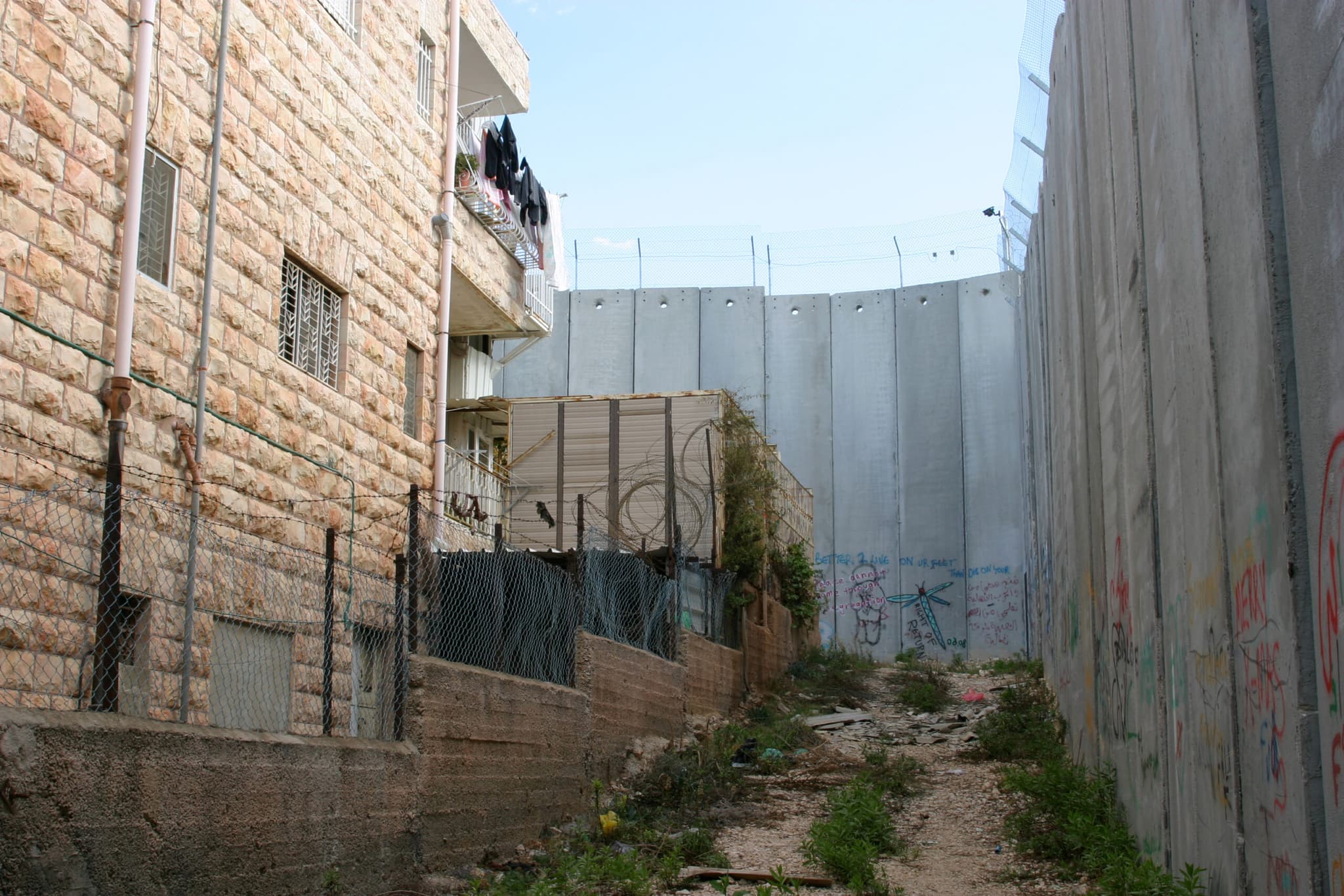
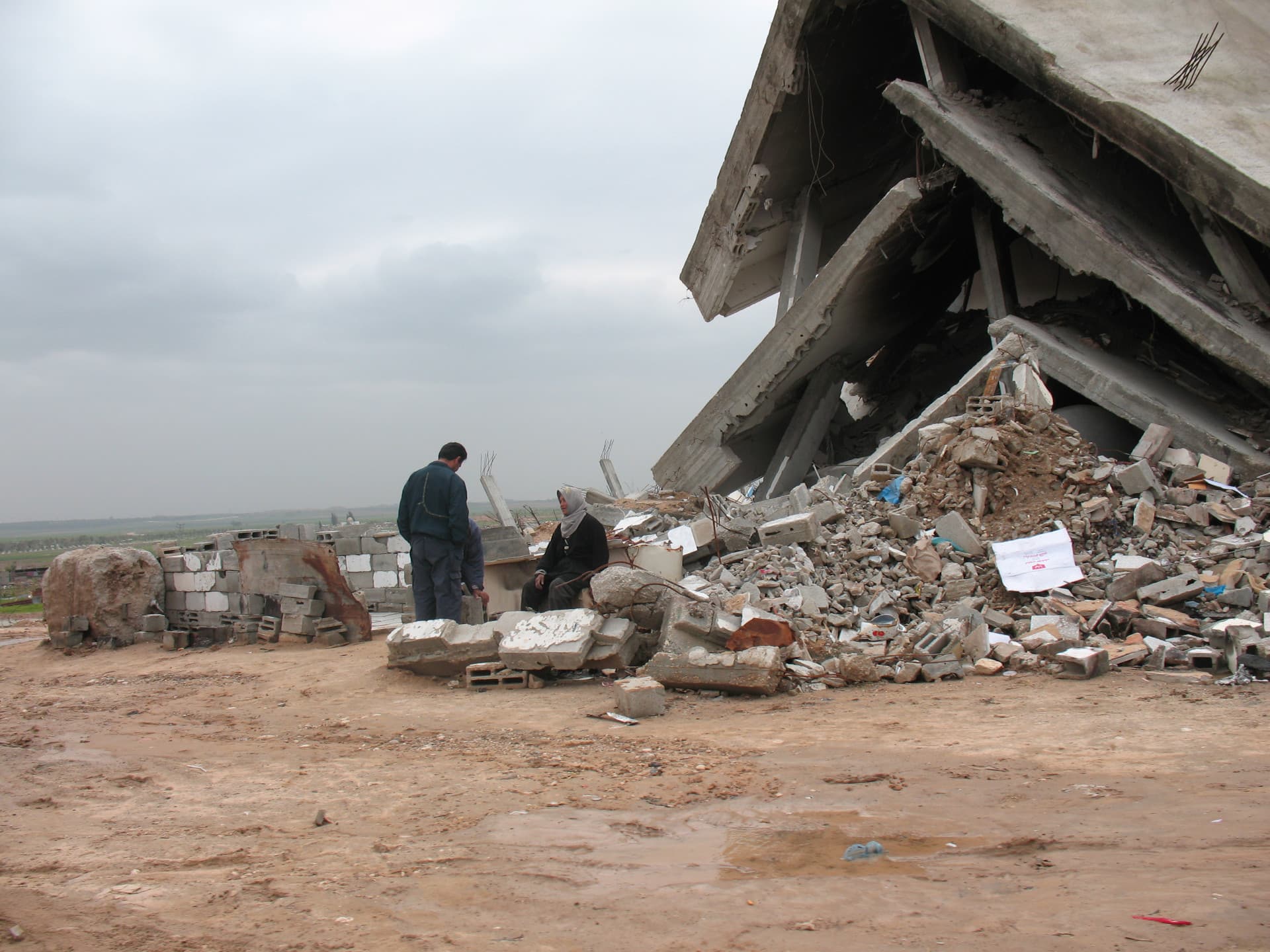
Palestinian Authority
2007 • Review of CSOs’ licenses
2010s
 2010 • Storming of the Mavi Marmara
2010 • Storming of the Mavi Marmara
On 31 May, the Israeli navy storms the Turkish passenger ship Mavi Marmara – part of the “Gaza Freedom Flotilla” purporting to deliver aid to Gaza in circumvention of the naval blockade – in international waters. Nine passengers are killed in the resulting altercation, drawing international condemnation.
 2012 • Palestine accorded non-member observer State status at the UN
2012 • Palestine accorded non-member observer State status at the UN
United Nations (UN) General Assembly Resolution 67/19 accords the State of Palestine non-member observer State status at the UN. The date – 29 November 2012 – marks exactly 65 years since General Assembly Resolution 181 (II) first approved the partition plan for the territory of Mandatory Palestine.
 2015 • Palestine joins the ICC
2015 • Palestine joins the ICC
In January 2015, Palestine accedes to the Rome Statute of the International Criminal Court (ICC), becoming an effective member in April 2015. Palestine also accepts the Court’s jurisdiction on an ad hoc basis for crimes “committed in the occupied Palestinian territory, including East Jerusalem, since June 13, 2014”. Accordingly, the ICC’s temporal jurisdiction in respect of the Situation in Palestine commences on 13 June 2014.
 2016–2022 • Changes to the Palestinian judicial system
2016–2022 • Changes to the Palestinian judicial system
PA President Abbas enacts a series of laws by decree that change the makeup of the judiciary and its relationship with the other branches of government.
In 2016, a presidential decree establishes the Constitutional Court as the highest court of the land. Critics point out that this continues the sidelining of the PLC and fear that it will further reinforce the concentration of control over all three branches of government – executive, legislative, and judiciary – in the hands of the presidency. It is later reported that many Abbas loyalists are appointed to the Court. In 2018, the Court formally dissolves the PLC and determines that parliamentary elections should be held, which never take place.
A 2019 amendment by decree of the Judicial Authority Law of 2002 lowers the retirement age of judges from 70 to 60. On the same day, a law by decree is adopted which dissolves the High Judicial Council – the body that oversees the functioning of the judiciary, including the appointment of judges – as well as “[a]ll the bodies of the High Court and Courts of Appeals”. A Transitional High Judicial Council is set up instead, whose members are listed in the decree. Dozens of judges are reportedly forced to retire as a result.
In October 2022, a new body is established – the Supreme Council of Judicial Bodies and Authorities, headed by Abbas – which critics allege further cements the President’s “full control over the judicial system”.
 2018 • Nation-State Law adopted by the Knesset
2018 • Nation-State Law adopted by the Knesset
The Knesset enacts the Nation-State Law (“Basic Law: Israel – The Nation State of the Jewish People”), which defines the State of Israel as the “national state of the Jewish people” and stipulates that “[e]xercising the right to national self-determination in the State of Israel is unique to the Jewish people”. The Basic Law, which due to Israel’s lack of a formal written constitution is deemed to have quasi-constitutional status, also downgrades Arabic from official language to language with “special status” and elevates the “development of Jewish settlement” to “national value”.
 2018 • “Great March of Return” protests near the Gaza border fence
2018 • “Great March of Return” protests near the Gaza border fence
Throughout 2018 and 2019, Palestinians in Gaza take part in a series of popular protests near the Israeli border – the so-called “Great March of Return” – against Israel’s closure policy and in favour of Palestinians’ right of return. Demonstrators are met with considerable force on the part of the Israeli authorities; over 200 are killed and thousands injured.
In April 2021, PA President Abbas indefinitely postpones the legislative elections scheduled for 22 May – which would have been the first in 15 years – allegedly due to uncertainty as to whether Israel would allow Palestinians to cast their vote in unlawfully annexed East Jerusalem. Presidential elections, which were supposed to take place in July, are postponed as well. Critics surmise that Abbas’ real concern may be losing his hold on power.
Measures impacting civic space
Israeli authorities
2010 • Military Order 1651 enters into effect
2011 • “Nakba Law” adopted by the Knesset
2011 • “Boycott Law” adopted by the Knesset
2015 • Supreme Court decision on the “Boycott Law”
2015 • Northern Branch of the Islamic Movement declared as an “unlawful association”
2015 • Euromed Observer for Human Rights declared as an “unlawful association”
2016 • “NGO Transparency Law” adopted
2016 • Counter-Terrorism Law adopted
2017 • Amendment to the Entry into Israel Law adopted
2018 • “Loyalty in culture” law proposed
2018 • “Breaking the Silence Law” adopted
2019 • No renewal of TIPH’s mandate in Hebron
2019 • “Terrorists in Suits” report
2019 • Raid of Addameer’s offices
2019 • Omar Shakir of HRW expelled
Palestinian Authority
2011 • Decree law on funds of dissolved associations
2015 • Oversight committee for associations established
2015 • Funding for non-profit companies conditioned on government approval
2018 • “Cybercrime Law” enacted
2019 • Circular concerning the boards of directors of associations
2020s
 2021 • ICC Prosecutor announces the opening of an investigation; Israel refuses to engage
2021 • ICC Prosecutor announces the opening of an investigation; Israel refuses to engage
On 3 March, the Prosecutor of the ICC announces that her Office has initiated an investigation with regards to the Situation in Palestine, the State of Palestine having become party to the ICC in 2015. As part of a larger pattern of refusal to cooperate with international oversight mechanisms relating to human rights and compliance with international law, the Israeli authorities declare that they will not cooperate with the Court.
In February 2021, Pre-Trial Chamber I of the Court had confirmed that the scope of the ICC’s territorial jurisdiction extends to the West Bank, including East Jerusalem, and the Gaza Strip. Accordingly, the Court has jurisdiction over international crimes allegedly committed on this territory since 13 June 2014 by Israeli and Palestinian authorities as well as Palestinian armed groups.
 2021 • Palestinian elections cancelled
2021 • Palestinian elections cancelled
In April 2021, PA President Abbas indefinitely postpones the legislative elections scheduled for 22 May – which would have been the first in 15 years – allegedly due to uncertainty as to whether Israel would allow Palestinians to cast their vote in unlawfully annexed East Jerusalem. Presidential elections, which were supposed to take place in July, are postponed as well. Critics surmise that Abbas’ real concern may be losing his hold on power.
 2021 • Resurging violence
2021 • Resurging violence
In the context of resurging violence in May, Palestinians take to the streets across Israel and the oPt, in a show of unity “unprecedented” in recent years. Israeli authorities arrest an estimated 3,100 Palestinians. For background information on one of the root causes of resurging violence – displacement and dispossession in Jerusalem’s Sheikh Jarrah neighbourhood – see the IHL Centre’s timeline.
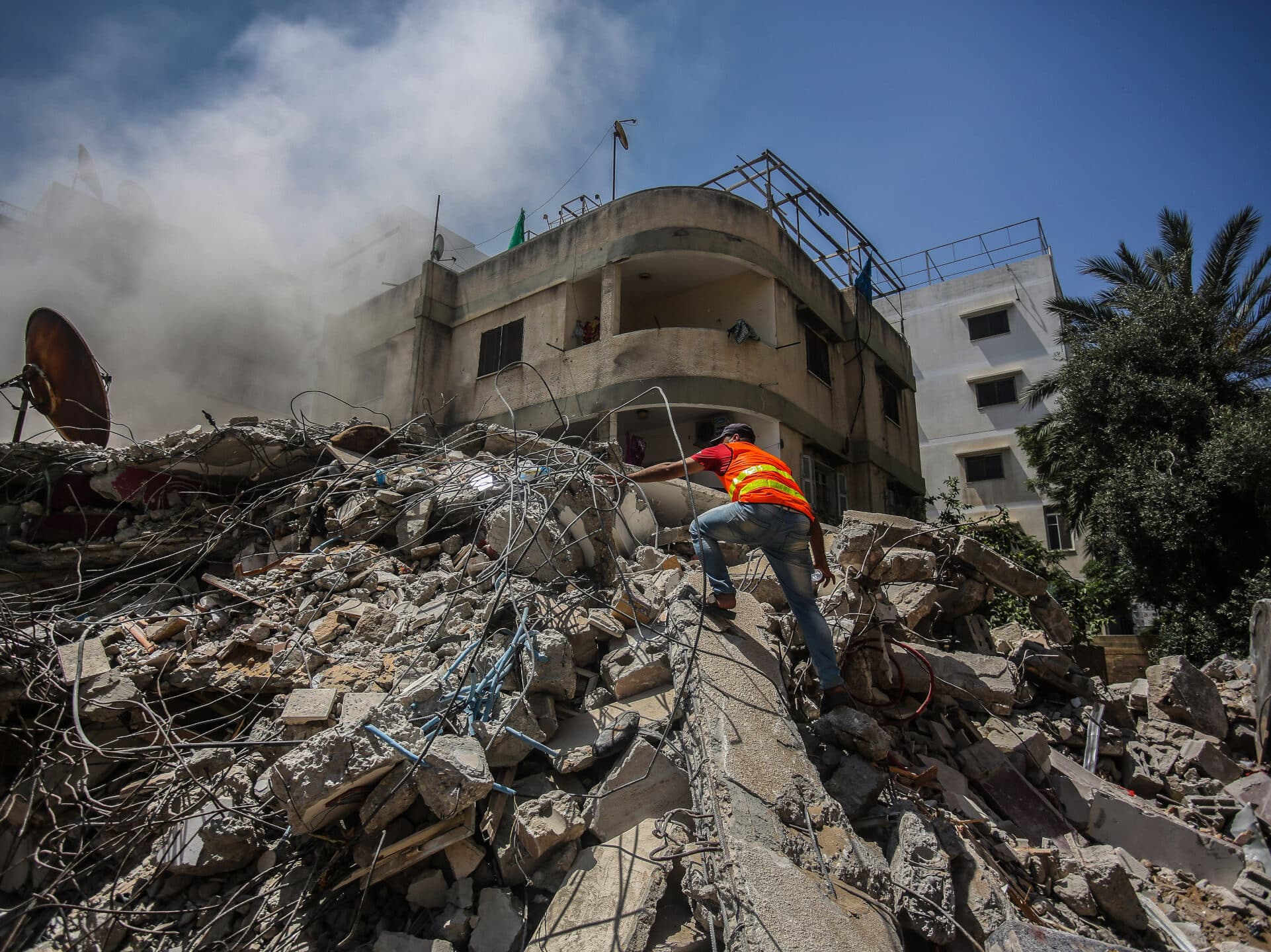
 2021 • Establishment of a Commission of Inquiry
2021 • Establishment of a Commission of Inquiry
During a special session convened in the context of the May 2021 hostilities, the UN Human Rights Council adopts a resolution establishing the Independent International Commission of Inquiry on the Occupied Palestinian Territory, including East Jerusalem, and Israel. The mandate of the Commission includes investigating “all alleged violations of international humanitarian law and all alleged violations and abuses of international human rights law leading up to and since 13 April 2021, and all underlying root causes of recurrent tensions, instability and protraction of conflict, including systematic discrimination and repression based on national, ethnic, racial or religious identity”. It extends to acts committed by Israel, Palestinian authorities, and armed groups.
 2022–2023 • Request for an advisory opinion from the ICJ
2022–2023 • Request for an advisory opinion from the ICJ
On 30 December 2022, the General Assembly passes a resolution requesting an advisory opinion from the ICJ on the legal consequences of “the ongoing violation by Israel of the right of the Palestinian people to self-determination, [of] its prolonged occupation, settlement and annexation of the Palestinian territory occupied since 1967, including measures aimed at altering the demographic composition, character and status of the Holy City of Jerusalem, and [of] its adoption of related discriminatory legislation and measures”, as well as the legal status of Israel’s occupation as a result of these “policies and practices”.
On 6 January 2023, the Israeli security cabinet imposes punitive measures on the PA for its role in requesting the advisory opinion, and determines to “take action against organizations that promote hostile activity, including political-legal activity against Israel under the guise of humanitarian activity”. Two days later, it is reported that Israel has revoked the travel permit of Palestinian Foreign Minister Riyadh al-Maliki.
On 16 January 2023, Palestinian officials release a statement signed by 37 countries, plus Algeria as Chair of the Arab Summit and Member of the Arab Troika, and Pakistan as Chair of the Organisation of Islamic Cooperation (OIC). In the statement, the signatories “express [their] deep concern regarding the Israeli government’s decision to impose punitive measures against the Palestinian people, leadership and civil society following the request by the General Assembly of an advisory opinion by the International Court of Justice”. They include countries that voted against the request for an advisory opinion in December 2022, such as Estonia, Germany, Italy, Lithuania, and Romania, and countries that abstained, including Brazil, Bulgaria, Cyprus, Denmark, Finland, France, Greece, Iceland, Japan, Latvia, Liechtenstein, the Netherlands, New Zealand, Norway, the Republic of Korea, Slovakia, Spain, Sweden, and Switzerland. More countries join in the following days.
 2022–2023 • Inauguration of the 37th Israeli government
2022–2023 • Inauguration of the 37th Israeli government
On 29 December 2022, the 37th government of Israel is sworn in, deemed the most right-wing in the country’s history. The governing coalition comprises Prime Minister Netanyahu’s Likud party, the far-right Otzma Yehudit, Religious Zionism, and Noam parties, as well as the Haredi (ultra-Orthodox) parties Shas and United Torah Judaism (UTJ).
Netanyahu summarizes the proposed guidelines of his government as follows: “The Jewish people have an exclusive and unquestionable right to all areas of the Land of Israel. The government will promote and develop settlement in all parts of the Land of Israel – in the Galilee, the Negev, the Golan Heights, [and] Judea and Samaria [i.e., the occupied West Bank].”
Prior to the inauguration of the new government, the Knesset legislates to the effect of allowing Aryeh Deri (Shas) to serve as minister despite a recent criminal conviction, granting extended powers over the police to National Security Minister Itamar Ben-Gvir (Otzma Yehudit), and enabling Bezalel Smotrich (Religious Zionism) – since appointed Finance Minister – to also serve as Minister in the Defence Ministry alongside Defence Minister Yoav Gallant (Likud), with control over COGAT and the Civil Administration in the West Bank. These bodies oversee Palestinian planning and construction and regulate access and movement, amongst other issues.
A series of legislative proposals draw criticism from domestic and international commentators across the political spectrum. Much of this criticism is directed at the so-called “override clause”, which would allow a simple parliamentary majority (61 out of 120) to override rulings of the Supreme Court in its capacity as High Court of Justice that particular pieces of primary legislation contravene Israel’s Basic Laws (higher-order, quasi-constitutional laws that in the absence of a formally codified constitution protect certain fundamental rights and values). It is feared that this effective neutering of judicial review and oversight over the legislative branch of government will further weaken the separation of powers and undermine the protection of minorities. Indeed, members of the governing coalition (for instance, Ben-Gvir, Smotrich, and Noam’s Avi Maoz) have on previous occasions issued statements and taken actions that convey strong antagonism towards liberal democratic values.
Justice Minister Yariv Levin (Likud) also presents a plan to abolish the so-called “reasonableness standard”, on the basis of which Israel’s Supreme Court sitting as High Court of Justice has reviewed decisions of the executive, and to reform the composition of the Judicial Appointments Committee so as to leave politicians in the majority over judges.
National Security Minister Ben-Gvir previously floated the idea of according immunity to members of the Israeli security forces for actions taken in the context of operations, raising concerns about a further entrenchment of impunity for excessive use of force.
On 3 January 2023, in a move widely seen as provocative, Ben-Gvir visits the Temple Mount/Haram al-Sharif, drawing international condemnation and comparisons to then-opposition leader Ariel Sharon’s visit in September 2000, which triggered the Second Intifada. A few days later, Israeli Police Commissioner Kobi Shabtai instructs district commanders to implement a general prohibition against the public display of the Palestinian flag, having been briefed to do so by National Security Minister Ben-Gvir.
 2023 • Developments under Israel’s 37th government
2023 • Developments under Israel’s 37th government
January–September 2023 • Protests against “judicial overhaul”
January 2023 • Netanyahu dismisses Aryeh Deri following High Court ruling
February 2023 • New outposts and settlement units
February 2023 • Smotrich granted extended powers over the Civil Administration
February 2023 • Settler violence in Huwara
March 2023 • Smotrich speaks in front of a map of “Greater Israel” at a Paris conference, claims “there is no such thing as Palestinians”
March 2023 • Amendment of the Disengagement Law
March 2023 • First “judicial overhaul” law prevents the Attorney General from declaring a Prime Minister unfit for office
March 2023 • Netanyahu fires Defence Minister Gallant, temporarily halts “judicial overhaul” after mass protests
April 2023 • Highest number of administrative detainees in two decades
April 2023 • Escalation of violence
April 2023 • Settler march to Evyatar outpost
April 2023 • Gallant to remain Defence Minister, reversing earlier dismissal
April 2023 • Prayer at Homesh settlement outpost
May 2023 • Smotrich on settlement policy
May 2023 • Ben-Gvir visits the Temple Mount/Haram al-Sharif for the second time
May 2023 • Approval of the state budget
May 2023 • Residents of Ein Samia flee settler violence
May 2023 • Draft resolution on operationalizing the Nation-State Law
May 2023 • Developments in Homesh
June 2023 • Military raid in Jenin
June 2023 • Shooting attack in Eli
June 2023 • Settlers enter Evyatar outpost
June 2023 • Settler violence in Turmus Ayya and across the West Bank
June 2023 • Ben-Gvir calls for more outposts
June 2023 • Approval of new housing units
July 2023 • Large-scale operation in Jenin refugee camp
July 2023 • Abolition of the “reasonableness standard” for judicial review of government decisions
July 2023 • Ben-Gvir visits the Temple Mount/Haram al-Sharif for the third time
January–August 2023 • Highest daily average of incidents of settler violence; 1,105 Palestinians displaced
September 2023 • Supreme Court hearing on the law abolishing the “reasonableness standard”
September 2023 • Operations in Jenin and Aqabat Jabr refugee camps
September 2023 • Raids in Kafr Dan, Nur Shams refugee camp, and at Birzeit University
August–September 2023 • Violent suppression of protests near the Gaza border fence
 2023 • Abbas dismisses 12 governors in the West Bank and Gaza
2023 • Abbas dismisses 12 governors in the West Bank and Gaza
On 10 August, PA President Abbas issues a decree dismissing governors from 12 provinces in the West Bank and Gaza (the latter exercising only symbolic powers, Gaza being ruled by the Hamas-controlled de facto authorities since 2007). Although the President’s office reportedly announced that the governors had “retired”, they first found out about their dismissal in the media, according to Ha’aretz. It was also reported that Abbas set up a presidential committee to select new candidates for the vacant positions, requiring that nominees be presented to him for final approval.